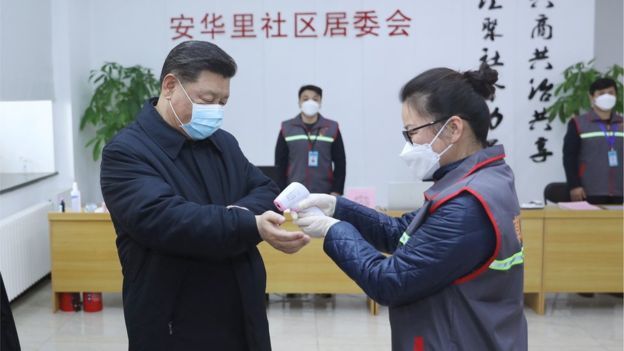 |
|
China's president has kept a low profile since the outbreak began |
China has "removed" several senior officials over their handling of the coronavirus outbreak - as the death toll passed 1,000.
The party secretary for the Hubei Health Commission, and the head of the commission, were among those who lost their jobs.
They are the most senior officials to be demoted so far.
The deputy director of the local Red Cross was also removed for "dereliction of duty" over "handling of donations".
On Monday, some 103 died in Hubei province alone, a daily record, and the national death toll is now 1,016.
But the number of new infections nationally was down almost 20% from the day before, from 3,062 to 2,478.
Hubei's health commission confirmed 2,097 new cases in the province on Monday, down from 2,618 the previous day.
According to state media, there have been hundreds of sackings, investigations and warnings across Hubei and other provinces during the outbreak.
But removal from a certain role - while regarded as a censure - does not always mean the person will be sacked entirely, as it can also mean demotion.
And as well as being removed from their posts, officials can also be punished by the ruling Communist Party.
For example, the deputy head of the Red Cross, Zhang Qin, was given "a serious intra-Party warning as well as a serious administrative demerit", state media said.
Earlier this month, the deputy head of the Wuhan bureau of statistics was removed, also with a "serious intra-party warning a well as a serious administrative demerit for violating relevant regulations to distribute face masks".
The head of the health commission of Huanggang, the second-worst hit city in Hubei after Wuhan, has also been removed.
In recent days, Chinese authorities have increasingly been criticised for their handling of the crisis.
The death of a doctor whose early warnings were suppressed by authorities sparked widespread public anger.
What's the latest in China?
There are now more than 42,200 confirmed cases across China, in the country's gravest public health crisis since the Sars outbreak in 2002-3.
The Hubei health commission said the province had a total of 31,728 cases with 974 deaths by the end of Monday - a fatality rate of 3%.
More than three-quarters of the deaths have been in Hubei's provincial capital, Wuhan, the centre of the outbreak. The city of 11 million has been in lockdown for weeks.
A World Health Organization mission arrived in China on Monday to work with Chinese officials.
The mission is led by Bruce Aylward, who oversaw the WHO's 2014-2016 response to the Ebola epidemic in West Africa.
In a rare public appearance amid the outbreak, China's President Xi Jinping on Monday visited health staff in Beijing treating patients infected with the new coronavirus.
He wore a face mask during his meeting with health workers in Beijing but is yet to visit Wuhan.
President Xi urged "more decisive measures" to combat the virus and said "we must have confidence that we will eventually win this battle against the epidemic".
What about the rest of the world?
Four new UK cases were announced on Monday - taking the total number of people infected in the UK to eight. The government has warned of a "serious and imminent threat".
Meanwhile, 65 more people have tested positive on the quarantined Diamond Princess cruise ship moored off Japan - meaning 135 out of 3,700 passengers have caught the virus.
US President Donald Trump said on Monday he believed the outbreak would disappear in April due to warmer weather.
What are the symptoms of coronavirus and what can help stop its spread?
The main signs of infection are fever (high temperature) and a cough as well as shortness of breath and breathing difficulties.
Frequent hand washing with soap or gel, avoiding close contact with people who are ill and not touching your eyes, nose and mouth with unwashed hands, can help cut the risk of infection.
Catching coughs and sneezes in a tissue, binning it and washing your hands can minimise the risk of spreading disease. BBC